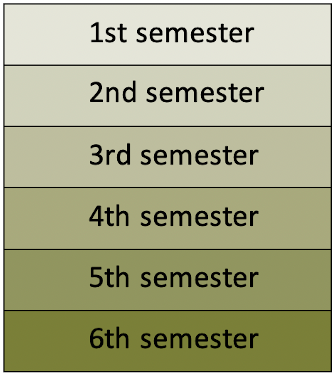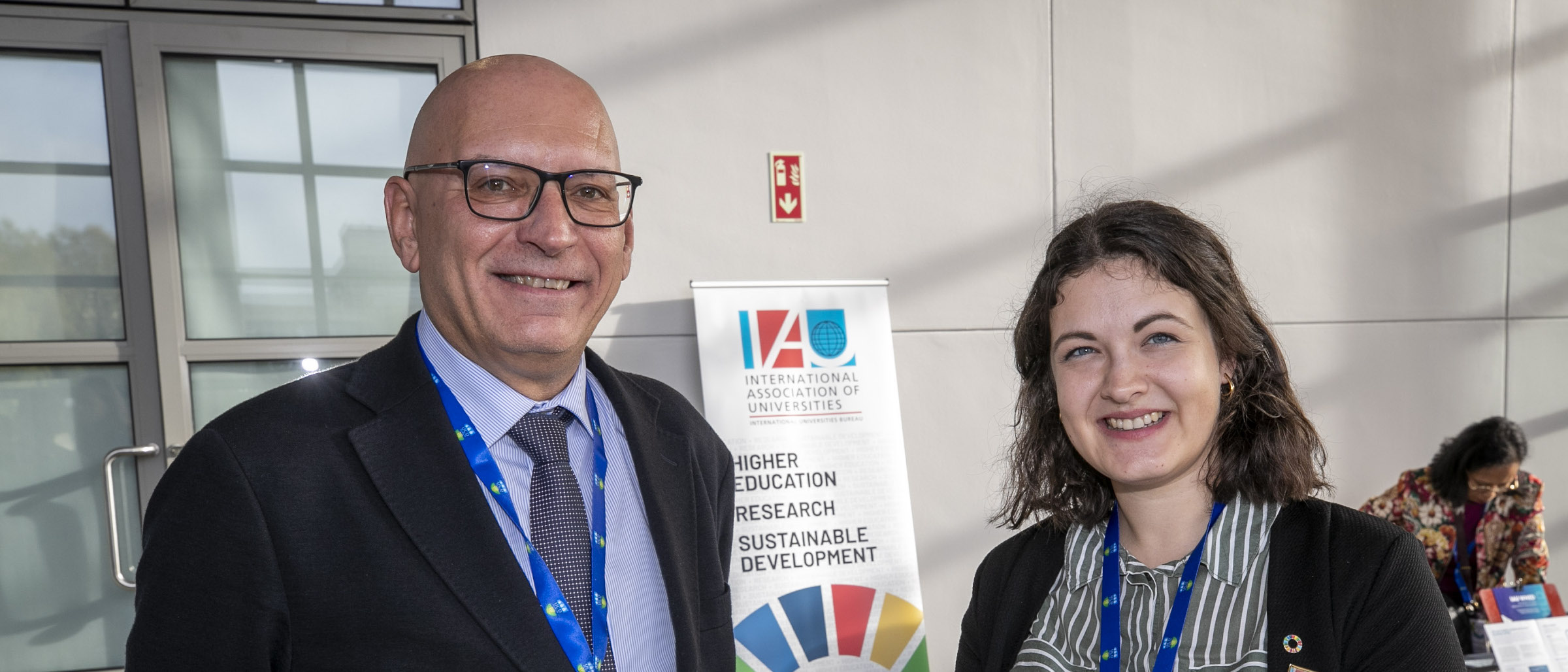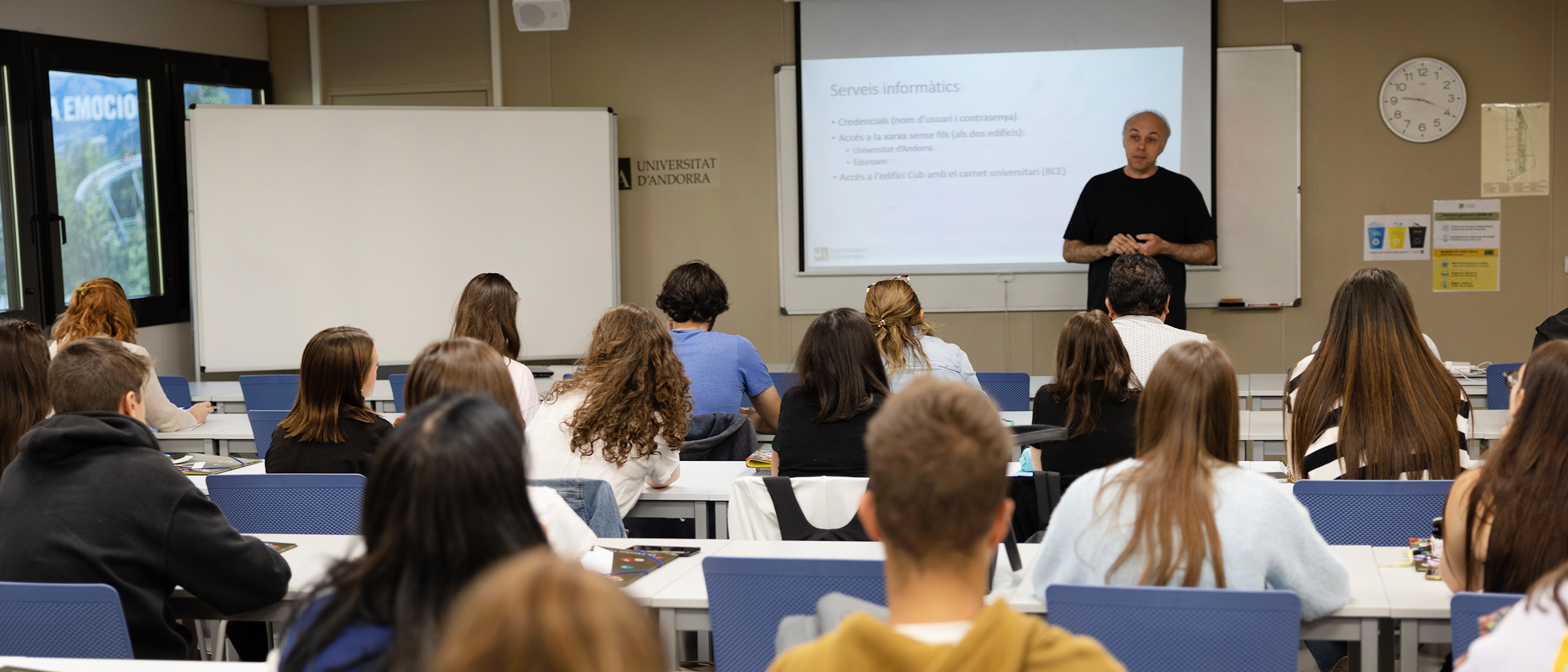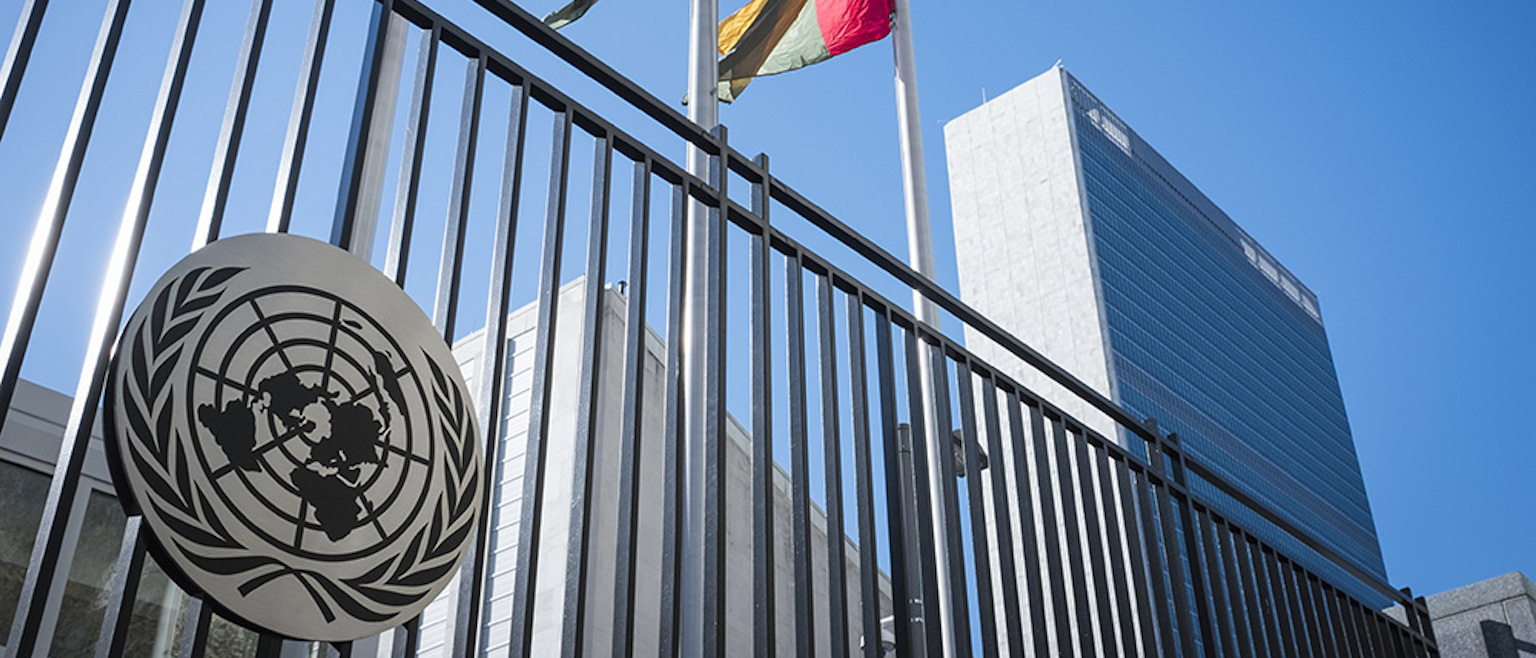Doctoral Programme
The University of Andorra’s Doctoral Programme aims to train researchers through the completion of a doctoral thesis consisting of an original and unpublished research paper, leading to the state qualification of doctor by the University of Andorra.
The programme lasts a minimum of six full-time semesters (three years) and a maximum of ten (five years). Doctoral candidates have a thesis supervisor who directs and monitors their work throughout their studies. The thesis supervisor is assigned by the University of Andorra and must hold a doctoral degree, successful experience as a thesis supervisor and must be an expert in the area of the doctoral candidate’s area of study.
Possible fields of research include all those that may have an implication in the economic and social development of Andorra and in the improvement of the quality of life of its citizens. Research in economics, education, language, laws and health are prioritized.
The University of Andorra’s Doctoral Programme is characterized by its follow-up schedule that is structured into yearly goals and monitoring reports for each semester, supervision and international evaluations, and the promotion of multidisciplinary research. Training and events are on-site, and, for the study of doctoral candidates, the university has spaces that can be booked each semester.
European level:
EHEA’s third cycle
Modality:
On-campus or blended
Credit load:
180 european credits
Duration:
6 semesters
Languages:
Catalan and English
Calendar:
from September to June
Contact:
Bárbara Cerrato (doctorat@uda.ad)
The University of Andorra (UdA) launched its Doctoral Programme in September 2009. As a small university, the UdA has had to reinvent itself in order to adapt to the country’s reality while adhering to its high quality criteria. This challenge has been made possible thanks to the four basic features that define the UdA’s Doctoral Programme:
- Multidisciplinary programme
- Training on research skills
- Structured tracking: milestones and follow-up reports
- International supervision and evaluation
Currently, the following areas are considered research priorities:
- Economics
- Education
- Language
- Laws
- Health
Admission requirements
- To access the state Doctoral Programme, it will be necessary to possess an Andorran Master’s degree or an official degree of the same level, recognized by the Ministry in charge of Higher Education.
- Those who have a bachelor’s degree in accordance with previous arrangements can also access the Doctoral Programme. These candidates must complete their training in this area during the doctoral studies, with a minimum of 60 European credits.
Doctoral students who enter the Doctoral Programme from a master’s program without specific training in research must complete their training in this area during doctoral studies, according to the eligibility criteria established by the University.
First enrolment
Documentation
Documents which grant access to doctoral studies in the Principality of Andorra:
- Original degree and a photocopy, if the student possesses a license or Master’s degree from the state of Andorra
- Certification of access to doctoral studies issued by the Government of Andorra, in the case of foreign university degrees.
Mentor
During the first two semesters, the doctoral student will be given a mentor who will guide him/her during that initial period of study. The mentor will be assigned by the University of Andorra at the student’s proposal, and the mentor must possess a doctoral degree.
Enrolment modalities
The definition and distribution of courses in the plan of studies allows two types of study per semester:
- Full-time enrolment: Corresponds to 30 credits per semester and concludes with the corresponding monitoring point (an activity report or annual report)
- Part-time enrolment: Corresponds to a minimum of 15 credits per semester
Upon completing their training, the doctoral student must prove that they have acquired the following skills and knowledge:
- A systematic comprehension of a field of study and mastering of the skills and research methods related to this field;
- The ability to conceive, design, put into practice and adopt a substantial research project with academic rigour;
- A contribution through an original and unpublished piece of research that broadens the boundaries of knowledge by developing a substantial corpus, that merits an indexed publication on a national or international scale;
- The capability of making a critical analysis, an evaluation and a synthesis of new and complex ideas;
- The ability to communicate with colleagues, the global academic community and society, about their field of knowledge.
- The ability to promote, in academic and professional contexts, technological, social or cultural progress within a knowledge-based society.
Extracted and translated from: Decret de creació del títol de doctor (BOPA núm. 36, any 20 del 30 d’abril de 2008).
Tracking Progress by Semester
The Doctoral Programme has three monitoring points:
- Semester plan (completed by the doctoral candidate)
- Report of activities and results (completed by the doctoral candidate)
- Semester report by the mentor or thesis director (completed by the mentor or thesis director)
In order for the doctoral candidate to pass to the next semester, they must present the Report of Activities and Results and obtain a favourable report from the mentor or thesis supervisor.
In addition, if the semester involves an objective, the student must also meet such an objective favourably. The Research and Doctoral Commission will decide on the advancement by semester.
Milestones of the Doctoral Programme
The Doctoral Programme defines seven milestones throughout the course of its development:

At the beginning of the 1st semester
1. Admission to the Doctoral Programme
At the end of the 2nd semester
2. Research Project presentation
3. Final admission and supervision assignment
At the end of the 4th semester
4. Publications
5. External assessment and acceptance of Doctoral Thesis Progress Report
At the end of the 6th semester
6. Doctoral Thesis external assessment
7. Doctoral Thesis final evaluation
Cross Training
Each year, the International Doctoral School of the University of Andorra (UdA) programmes several research courses designed as a cross-disciplinary training and aimed at people with a first-cycle university degree. Check them out here.
Doctoral students will have a thesis supervisor who will guide them and monitor their work throughout the doctoral studies. The thesis supervisor will be assigned by the University of Andorra and in order to supervise a doctoral thesis it is mandatory to have the accreditation from the University of Andorra.
The Research and Doctoral Commission will accredit thesis mentors on the basis of the fulfilment of one of the following two requirements: 1) Have experience supervising doctoral theses; 2) Completing the training aimed at novice mentors at the University of Andorra and having successfully co-supervised with an expert supervisor at least one doctoral thesis.
The thesis supervisor will be assigned, at the latest, after the second semester, once the annual report of the first year and the Research Project have been presented and approved.
During the first two semesters, the doctoral candidate will have a mentor who will guide him during this first period of study. The mentor will be assigned by the university at the student’s proposal and must have a doctoral degree and be an expert in the area of study of the doctoral candidate.
Documents
Bones pràctiques en la supervisió dels doctorands a la Universitat d’Andorra
The doctorate is the highest academic qualification at the University. It enables one to become a researcher and it provides a degree of professional prestige that allows for career promotion and reaching the highest professional levels in both public and private companies.
The main career opportunities available to doctoral graduates are:
- Researcher or professor at universities and research institutions
- R&D departments’ specialist at private companies
- Consultant at companies that require the skills that a doctor has acquired: analytical skills, logical thinking, creativity and problem-solving.
- Editor and content creator for companies that need to edit and communicate their content.
- Researcher at cultural organisations with dissemination and educational purposes that need the research, writing, analytical and communication skills that are acquired by a doctor during the development of their dissertation.
Study programme publication (Official Gazette of the Principality of Andorra):
- Decret 299/2023, del 7-6-2023, de renovació del pla d’estudis de doctorat de la Universitat d’Andorra
- Decret del 4-07-2012 de modificació del Decret del 4 de març del 2009 d’aprovació dels plans d’estudis del programa de Doctorat de la Universitat d’Andorra
- Decret del 4 de març del 2009 d’aprovació dels plans d’estudis del programa de Doctorat de la Universitat d’Andorra






